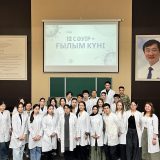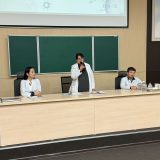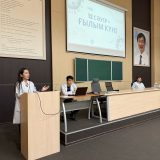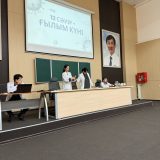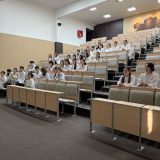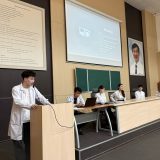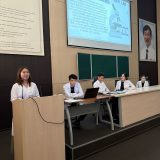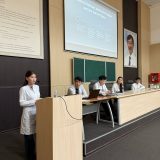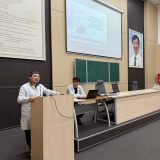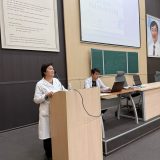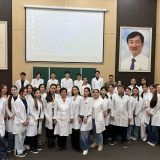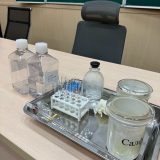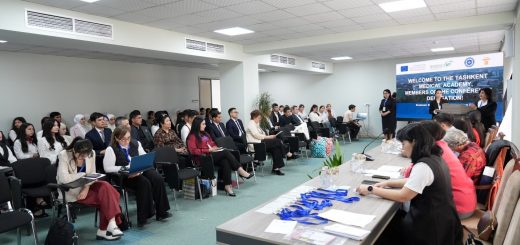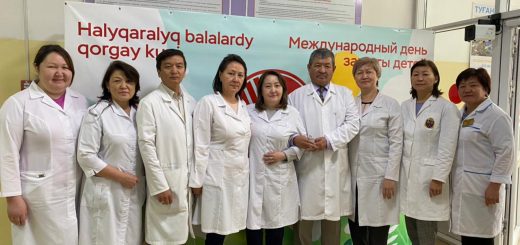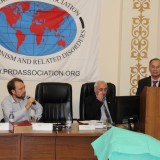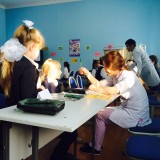Open Educational Session for the Day of Science at the Department of Pharmaceutical and Toxicological Chemistry
On April 12, Kazakhstan celebrates the professional holiday of scientific workers – Science Day. Representatives of the scientific community mark this day annually. At the Department of Pharmaceutical and Toxicological Chemistry, an open educational lesson was held on the topic “April 12 – Science Day.”
This date is associated with the birthday of the man who stood at the origins of scientific activity in Kazakhstan – academician Kanysh Imantayevich Satpayev, the first President of the Academy of Sciences of the Kazakh SSR, who headed it in 1946. He left an indelible mark on science and inspired many followers.
Science is the driving force of humanity. The state is making great efforts to advance science. Thanks to comprehensive support from the Head of State, positive changes have occurred in various scientific fields such as physics, chemistry, and biology. Fundamental scientific directions in pharmacy and medicine are also rapidly developing.
Science Day is celebrated at the Department of Pharmaceutical and Toxicological Chemistry as a day of recognition for scientists, Doctors of Pharmaceutical Sciences, and professors involved in professional science: R.D. Dilbarkhanov, E.T. Tegisbayev, A.S. Beysenbekov, E.M. Bisenbayev, A.U. Tulegenova, T.B. Bayzoldanov, and R.A. Omarova, who contributed to the development of science at the S.D. Asfendiyarov Kazakh National Medical University. The achievements of these scholars have been recognized with high governmental awards. Their mission is to create scientific and cultural potential in accordance with the mission of an Innovative University.
Science at the Department of Pharmaceutical and Toxicological Chemistry is currently developing along several initiative-based topics:
— «Theoretical and Experimental Aspects of Drug Development» (state registration number №0123PKI0401).
— «Search for New Compounds and Evaluation of Pharmacological Activity In Silico.»
— «Development of Therapeutic and Prophylactic Toothpaste Technology» (state registration number №0123PKI0425).
Two initiative projects are being implemented under the leadership of
Doctor of Pharmaceutical Sciences A.K. Boshkayeva.
The goal of these research initiatives is to develop a theoretically grounded strategy for the targeted synthesis of new chemical compounds with acceptable physicochemical profiles and biological activity, followed by experimental development of targeted potential drug candidates for treating socially significant diseases. This is one of the promising areas of new drug modeling using computer software.
Currently, foresight – a process and technology/tool for studying long-term trends in development and strategy effectiveness across all activity sectors, including science – is gaining popularity globally. It involves setting priorities and mobilizing actors to achieve results – essentially, looking into the future.
The main trend in foresight research is the development of new medicines:
- First Generation: Small Molecules (effective antiviral drugs; small molecules against HIV; drugs for cardiovascular diseases; anti-inflammatory drugs; small molecules for cancer; antiepileptic drugs). These are medicines with a low molecular weight (<900 Da), marking the beginning of modern pharmaceuticals. Although the first such drugs were developed in the 19th century, small molecules still dominate, comprising about 90% of all modern drugs.
- Second Generation: Biologics (hormones; enzymes; monoclonal antibodies; antibodies and immuno-oncology). Biologics are drugs whose active substances are produced by living systems and extracted using various biotechnological methods.
- Third Generation: Advanced Therapies (gene therapy; cell therapy). These cutting-edge treatments are based on cellular and genetic technologies and use living cells or genetic constructs, enabling modulation of bodily processes with previously unattainable precision.
The Department of Pharmaceutical and Toxicological Chemistry of the School of Pharmacy advances research in molecular modeling and molecular docking of new drug compounds (studying active site structures and their interactions with inhibitors). Modern methods for developing new drugs are being mastered and increasingly applied at the early stages of development (quantum chemistry methods, biological activity assays, etc.).
The open lesson dedicated to this day encourages student interest in science and the research directions of the department. Research opportunities are available for every student, master’s student, and PhD candidate, fostering future scientific progress.
Science Day makes a significant contribution to knowledge production, supports development, and helps all departments of the School of Pharmacy remain competitive in the global race.



